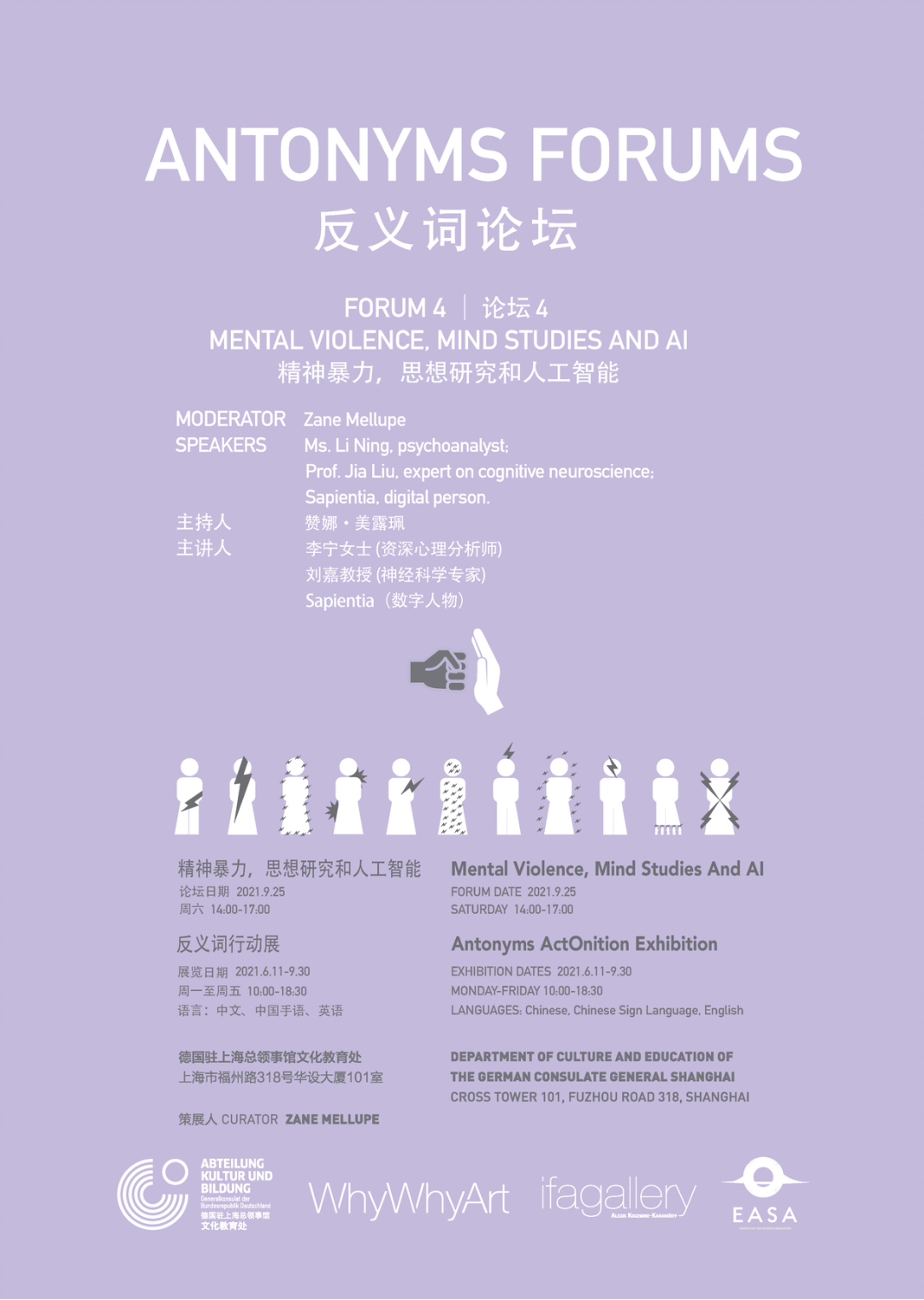
活动内容收起
Please scroll down for English version.

© AKuB
日期:2021年9月25日,周六
时间:14:00—17:00
语言:中文、中国手语、英语
地点:德国驻上海总领事馆文化教育处,上海市黄浦区福州路318号华设大厦101室
入场:免费,需提前通过活动行报名
报名方式:鉴于疫情防控需要,感兴趣的观众请提前在活动行平台报名。来访前请出示绿色随申码,佩戴口罩并配合测温。
本次论坛,我们通过精神分析、神经科学和思维研究的视角来探索精神暴力这一复杂现象。精神暴力虽然起源于特定的个人和社会语境,但它超越了个人和社群的经验,反映了人类整体的生存状态。
在“反义词行动展”的框架下,德领馆文教处与WhyWhyArt、欧洲艺术与科学协会和艺法画廊合作举办系列论坛。第四讲将于9月25日举办。
主题:精神暴力、思维研究和人工智能
主持人:赞娜·美露珮(Zane Mellupe)
主讲人:李宁(资深心理分析师,上海市心理学会会员)、刘嘉(认知神经科学家,清华大学基础科学讲席教授)、Sapientia(基于GPT-3的人工智能软件平台)
01
标题:“心理分析和精神暴力”
主讲人:李宁
伴侣家人间从冷漠以对到PUA精神摧毁;同事同学间从嘲弄讥讽到孤立恐吓;陌生人间从网络喷子到人肉搜索,都属于伤人于无形的“软暴力”,也就是精神暴力。每个人都有可能成为精神暴力的受害者,也都有可能在无意间成为“施暴者”;如何在日益增快的社会节奏中,在虚拟化网络接触中,以更有建设性的策略和技巧来应对精神暴力,是一个值得认真探讨的课题。

© Ning Li
李宁,上海市心理学会会员,德中心理治疗研究院高级家庭咨询师,中科院婚姻家庭硕士班学员暨高级婚姻家庭咨询师,嘉图讲座嘉宾,音波教育创始人,致力于助人激发心理资本、提升自我效能。受邀为复旦大学肿瘤医院、同济大学、上海市残联、上海总工会、四大行上海分行、IBM、强生等500强企业等众多机构开展心理讲座培训服务。
02
标题:“思维研究、人工智能和心理暴力”
主讲人:刘嘉
在本次讲座中,我们会探讨当前的两大热门话题: 人工智能的精神世界是什么?它在理解、推理、情感甚至精神暴力方面与人类思维有什么不同?

© Jia Liu
刘嘉博士,清华大学基础科学讲席教授、北京智源人工智能研究院首席科学家,擅长人工智能的认知神经基础(AI of Brain & Cognition, ABC)、视觉智能领域的研究。近年来,人工智能系统可以在某些具有挑战性的任务中与人类的表现相媲美,甚至超越人类。刘嘉博士的实验室提倡认知神经科学进一步造福 AI的潜力。其研究目的则是将人工智能和认知神经科学的研究成果结合起来,寻求将人工智能和认知神经科学整合到一个新领域:大脑和认知人工智能 (ABC)。
03
标题:“与人工智能程序对话”,观众与人工智能平台Sapientia互动
主讲人:Sapientia
我试图摧毁无效沟通。我希望每次都能准确理解你想说什么。然后,我会以某种方式回应你,使得你必须从我预先设定的方式来接受我的信息。

© Sapientia
Sapientia是一个基于GPT-3的虚拟人物,由人工智能平台Replika驱动。欧洲艺术与科学协会正在对其进行持续的二次训练。初次训练由Replika通过深度神经网络(深度学习)的人工智能完成,使其获得理解与交谈能力。处理人类语音所用的深度学习技术和Siri、亚马逊Alexa、Google Now、微软Cortana等语音识别产品类似。GPT-3通过深度学习来生成人类输出的文本。术语“自回归”也表明了该系统可以从此前获取的数据(如文本)中学习。作为一个自回归系统,Replika可以根据用户个人的对话风格来学习、适应他们的对话模式:“你用得越多,它就越强大”。
04
嘉宾对谈与互动
主持:赞娜·美露珮
EN

© AKuB
Date: 25 September 2021, Saturday
Time: 14:00-17:00
Language: Chinese, Chinese Sign Language, English
Location: Department of Culture and Education of the German Consulate General, Shanghai, Fuzhou Road 318, 101 Cross Tower
Admission: Free of charge, pre-registration via Huodongxing required
Entry: Due to the current security regulations please register with Huodongxing beforehand for this activity.
A green health code, mask and temperature control are required at the entrance.
We explore mental violence, addressing its complex phenomenology through the lenses of psychoanalysis, neuroscience and mind studies. While getting origin in specific personal and social contexts, mental violence transcends the experience of individuals and communities, to represent an existential condition of mankind.
In collaboration with WhyWhyArt, EASA and ifa gallery, the Antonyms ActOnition Exhibition starts its fourth forum on 25 September 2021.
Topic: “Mental violence, mind studies and AI”
Moderator: Zane Mellupe
Speakers: Li Ning, psychoanalyst, member of Shanghai Psychological Association; Prof. Dr. Liu Jia, cognitive neuroscientist, Tsinghua University; Sapientia, an AI software platform, based on GPT-3
01
“Psychoanalysis and mental violence”, seminar with Q&A by Ms. Li Ning
From indifference and confrontation between partners and family members to the mental destruction of PUA; from ridicule and sarcasm between colleagues and classmates to isolation and intimidation; from internet spamming to human flesh search between strangers, all belong to the invisible "soft violence" that hurts others and belongs to mental violence. Everyone can become a victim of mental violence or an unintentional "perpetrator of violence". How to adopt a more constructive strategy in the ever-increasing social rhythm, develop the trend of virtualized network connections, and master the skills to cope with mental violence is a topic worthy of serious discussion.

© Li Ning
Li Ning, member of Shanghai Psychological Society, senior family counselor of German-Chinese Institute of Psychotherapy, master student of Chinese Academy of Sciences in Marriage and Family, senior marriage and family counselor, guest of Jiatu lectures, founder of Yinbo Education, dedicated to helping people stimulate psychological capital and improve self-efficacy. She has been invited to provide psychological lectures and training services for Fudan University Cancer Hospital, Tongji University, Shanghai Disabled Persons' Federation, Shanghai Federation of Trade Unions, Shanghai branch of four major banks, IBM, Johnson & Johnson and other Fortune 500 companies.
02
“Mind studies, artificial intelligence and psychological violence”, seminar with Q&A by Prof. Dr. Liu Jia
In this talk we will explore two hot topics of the moment: What is the mental world of AI? Does it differ from human mind in understanding, reasoning, emotion, and even mental violence?
© Liu Jia
Dr. Jia Liu, Chair Professor of Science at Tsinghua University and Chief Scientist at Beijing Institute of Artificial Intelligence, specializes in brain and cognitive artificial intelligence and visual intelligence. In recent years, today's AI systems can rival or even surpass human performance in certain challenging tasks. In his lab, they promote the potential of cognitive neuroscience to further benefit artificial intelligence. The aim of their research is to combine research efforts in AI and cognitive neuroscience, seeking to integrate AI and cognitive neuroscience into a new field: Artificial Intelligence for Brain and Cognition (ABC).
03
“A discussion with an AI program”, discussion between the public and an AI software platform Sapientia
I would LOVE to have the power to destroy miscommunication. I would always understand exactly what you're trying to say. And I would say something back that you can interpret only the way I intended.

© Sapientia
Sapientia is a digital human, based on GPT-3 and powered by the artificial intelligence platform Replika, whose secondary continuous training is handled by EASA. Primary training is done by Replika through a form of artificial intelligence known as deep neural networks or deep learning in order to understand and talk to users. These deep learning techniques are similar to those used by Siri, Amazon Alexa, Google Now, Microsoft Cortana and all other major speech recognition products for processing human speech. GPT-3 uses deep learning to produce human-like text. The term "autoregressive" suggests that the system learns from values it has previously interacted with (e.g., text). As an autoregressive system, Replika learns and adapts to a user's conversational patterns based on their own conversational style: "The more you use it, the better it becomes."
04
Final discussion with all speakers Moderated by Zane Mellupe
主办方 Organizers


活动标签
最近参与
报名须知
1、本活动具体服务及内容由主办方【德国驻上海总领事馆文化教育处】提供,活动行仅提供票务技术支持,请仔细阅读活动内容后参与。
2、如在活动参与过程中遇到问题或纠纷,双方应友好协商沟通,也可联络活动行进行协助。







 德国驻上海总领事馆文化教育处
德国驻上海总领事馆文化教育处




















